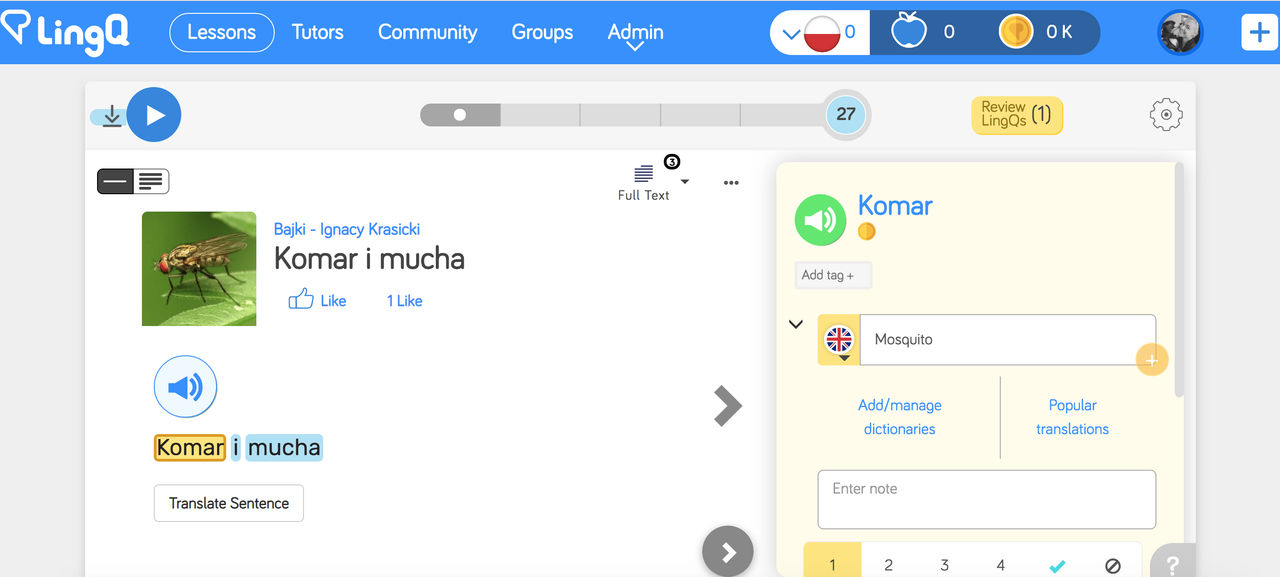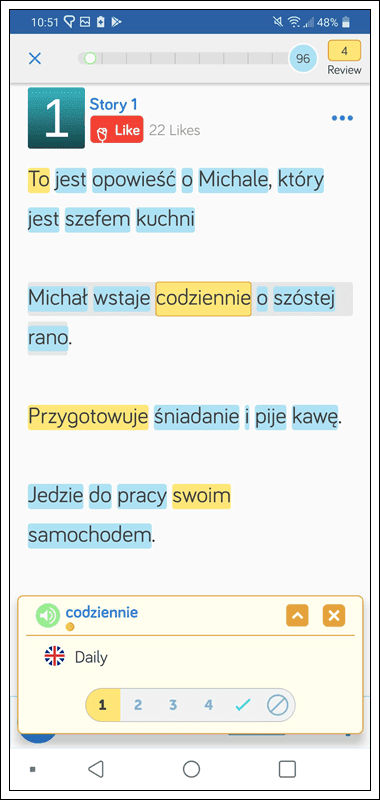Polish Audiobooks: Take Your Skills to the Next Level
Growing up in Poland, books were always a large and significant part of my childhood. There are not many memories I cherish more fondly than being tucked in by my grandmother and having her read Mały Książę, or My Little Prince by Antoine de Saint-Exupéry, Hobbit by J.R.R. Tolkien, short stories by Dostoevsky or poems by Adam Mickiewicz.
Unfortunately, as we grow up we do not always get to keep luxuries such as these; personal book readers whose voices are filled with love and faces full of expressions that manage to keep our attention until the story ends, until our eyelids give in to the fight to stay awake.
If you are one of those people that seems to have read more in the past than you do now and you are struggling to get back into it, audiobooks are the perfect starting point, especially if you want to use them as a language learning tool.

While I cannot teleport you back in time and share the evening I dozed off to my grandmother’s voice reading “O krasnoludkach i sierotce Marysi” or About the Dwarfs and Little Orphan Mary, I can recommend and suggest Polish stories and audiobooks for you to check out on your language learning journey.
Where to find Polish Audiobooks
Since this format is becoming more and more popular nowadays, it is also becoming more easily accessible. To purchase audiobooks in Polish, head to Empik. The site has an excellent selection.
One of the best, if not the best, websites for audiobooks and Polish Literature in general is Wolne Lektury or “Free Readings”. Not only is the free online library filled with more than 5000 titles, it includes literature recommended by the Ministry of National Education. The website is easy to navigate and is available in nine languages. You can read poems and stories and follow along the text as you listen to professionally recorded audio.
For example, Ignacy Krasicki’s Fables and Parables are written in 13-syllable lines. They are short and sweet and they rhyme. Many centre around animals, plants and inanimate objects.
You can find some of Krasicki’s fables as lessons on LingQ. Work your way through the text, translating any words and phrases you don’t know as you go. You can then use the vocabulary activities to study those words and phrases, or even better, learn them through repeated exposure in more Polish lessons on LingQ.

The Polish used in Krasicki’s fables is generally simple and straightforward, and therefore easy to follow. For example, here is one intermediate-level fable about The Blind Man and the Lame:
“A blind man was carrying a lame man on his back,
And everything was going well, everything’s on track,
When the blind man decides to take it into his head
That he needn’t listen to all that the lame man said.
“This stick I have will guide the two of us safe,” said he,
And though warned by the lame man, he plowed into a tree.
On they proceeded; the lame man now warned of a brook;
The two survived, but their possessions a soaking took.
At last the blind man ignored the warning of a drop,
And that was to turn out their final and fatal stop.
Which of the two travelers, you may ask, was to blame?
Why, ’twas both the heedless blind man and the trusting lame.”
Alternatively, check out the short story Dwa Żółwie ,or Two Turtles, here. It is about two turtles that make a bet to race each other, but since they are both too slow they lose all their spectators to boredom. A swallow flies by and says to them “before you learn how to run, you need to first learn how to walk”. Its’ length and simplicity make it a good short story for beginners.
Continuing with the animal theme, The Jungle Book, is another great recommendation, despite not being Polish. It was written by Rudyard Kipling, and can be seen as well as heard here in beautifully spoken Polish.
If you’re looking for something shorter to practice your Polish audio listening skills, Bolesław Leśmian’s poem about autumn, titled Wiosna is full of fun rhymes and colors. Like many other popular polish poems, it can also be found on YouTube.
Reduta Ordona, about the November Uprising, was written by one of the most famous poets in Poland and definitely deserves a mention. Adam Mickiewicz also wrote one of the most studied texts in Poland – Pan Tadeusz with the following famous verse:
“Litwo! Ojczyzno moja! ty jesteś jak zdrowie;
Ile cię trzeba cenić, ten tylko się dowie,
Kto cię stracił.”
This translates to:
“Lithuania, my fatherland! You are like health;
How much you must be valued, will only discover
The one who has lost you.”
To this day, the above poem is studied and recited in schools across Poland. While there are countless genres and stories to explore, don’t be overwhelmed or discouraged. Start with poems or shorter stories aimed at kids and listen to the audio more than once.
Learn Polish Faster Using LingQ
Immersing yourself in Polish doesn’t require you to travel abroad or sign up for an expensive language program.
However, it can be a bit tiresome to find interesting content, go back and forth between sites, use different dictionaries to look up words, and so on.
That’s why there’s LingQ. A language app that helps you discover and learn from content you love.

You can import videos, podcasts, and much more and turn them into interactive lessons.
Keep all your favourite Polish content stored in one place, easily look up new words, save vocabulary, and review. Check out our guide to importing content into LingQ for more information.
LingQ is available for desktop as well as Android and iOS. Gain access to thousands of hours of audio and transcripts and begin learning Polish today!

